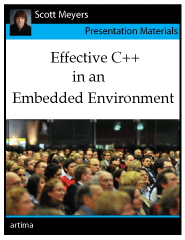Buy it now
Features
- Same content as the training course: The PDF you'll
get is an exact snapshot of Scott's full-color training materials on the
day he generates the PDF. You'll get not only the
slides Scott shows in class, you'll also get the accompanying notes—the
very ones Scott uses. To see exactly what you'll get you can
view a free sample.
- No DRM: You may copy the PDF to as
many devices as you like, annotate it in any way you want, print it in part
or in full as many times as you choose. Because the PDF is for your
personal use only, you are not permitted to provide copies to friends or
colleagues, may not install it on servers for public access, can't use it
as the basis for presentations, etc., but we trust you to adhere to these
restrictions; the PDF itself doesn't try to prevent unauthorized uses. (For
more permissive usage options, consider licensing
the materials.)
- Free updates for life: You are entitled to
free updates to the materials as long as Scott produces them.
Major revisions are included, so you won't have to pay again later for a "new edition."
- Volume discounts: Want a copy for every member of your team or department? Discounts of 30-50% off single-PDF prices apply to purchases of as few as 10 copies. As the saying goes, the more you buy, the more you save! Consult the discount schedule for details.
About the course
C++'s flexibility, modelling power, support for
object-oriented and generic programming, and extensive tool
set, make it attractive for embedded projects, but some
developers worry about code bloat and hidden performance
penalties. This seminar begins by confronting those issues
directly, then moves on to demonstrate how C++ can improve
the correctness, readability, and efficiency of embedded
software, in some cases accomplishing what is literally
impossible in C.
Detailed topic outline
- Overview of "Embedded C++."
- C++ under the hood:
- The efficiency philosophy behind C++
-
Detailed examination of virtual function implementation under
single and multiple inheritance
- Overview of how all other language features are implemented
- Causes of code bloat and how to address them
- The crucial role of inlining
- Three approaches to interface-based programming:
- Virtual functions and runtime polymorphism
- Separate compilation and link-time polymorphism
- Templates and compile-time polymorphism
- Applying C++ in Embedded Systems:
- Rules for what can and cannot be ROMed
- Memory management:
- Issues: speed, fragmentation, leaks, exhaustion
- Static allocation
- Dynamic allocation:
- Writing custom versions of new and delete
- LIFO allocation
- Pool allocation
- Block allocation
- Other options: regions and variable-sized allocators
- Modeling memory-mapped IO (MMIO):
- Putting objects at specific addresses:
- Placement new
- reinterpret_cast
- Compiler extensions
- Modeling MMIO registers directly vs. indirectly
- Creating shadow registers
- Preventing common usage errors
- Generalizing via templates
- Implementing callbacks for C APIs (e.g., ISRs):
- C++ functions C APIs can call
- Linkage and exception issues
- Approaches and their pros/cons:
- Using virtual functions
- Using std::tr1::function objects
- Overview of TR1 and Boost
- Interesting template applications:
-
Generating cost-free type-safe wrappers for void*-based code
-
Performing compile-time dimensional unit compatibility analysis
- Specifying finite state machines (FSMs)
- Considerations for safety-critical and real-time systems
- Sources for Additional Information
About the author
|
Scott Meyers
is one of the world's foremost
authorities on C++ software development. He provides training and
consulting services to clients worldwide.
Scott wrote the best-selling Effective C++ series (Effective C++, More
Effective C++, and Effective STL), is consulting editor for Addison
Wesley's
Effective Software Development Series, was a founding member of the
Advisory Board for The C++ Source, and
has served as a technical advisor to several start-up companies. In 2009
he received the
Dr. Dobb's Excellence in Programming Award.
He received his PhD in Computer Science from Brown University in 1993.
|
|
